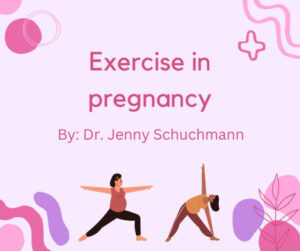 Did you know that most women can exercise in pregnancy? In fact, it is recommended that you continue your same activity level or start to regularly exercise when you become pregnant.
Did you know that most women can exercise in pregnancy? In fact, it is recommended that you continue your same activity level or start to regularly exercise when you become pregnant.
There are many benefits to regular exercise in pregnancy. Just to name a few:
– It can reduce back pain
– Improves constipation
– It may decrease your risk for pregnancy complications (such as diabetes in pregnancy, high blood pressure, and need for a c-section)
– Improves your overall health
– It can decrease your stress level and have a positive impact on your mental health
It is recommended to exercise at least 150 minutes per week during pregnancy. I usually tell patients that a good goal is 30 minutes, five days per week (and walking counts!). If you are new to exercise, then we suggest starting slowly and gradually increase your activity. One goal can be to start with as little as 5 minutes per day. You can add five minutes per day until you build yourself up to a goal of 30 minutes.
Suggestions for exercise include walking, swimming, water workouts, stationary bicycling, modified yoga, or pilates. If you are an experienced runner or regularly do activities not listed here, then you should check with your Ob/Gyn to see if these activities are safe to keep doing.
The Move Your Way website from the U.S. Department of Health and Human Services can help you find safe, fun ways to get active during and after pregnancy.
You should be sure to drink plenty of water before, during, and after your workout. Avoid becoming overheated.
Examples of activities to avoid are contact sports that put you at risk of getting hit in the abdomen, activities which may result in a fall (ie: surfing, gymnastics, downhill snow skiing), and hot yoga/pilates.
Now onto explain who should not exercise during pregnancy. A few examples – if you have certain risk factors for preterm labor, certain types of heart and lung diseases, if your water has broken preterm, an abnormality of your placenta, or bleeding during pregnancy. If you have any indication that your pregnancy is a high risk, then please consult with your physician about whether it is recommended you exercise regularly.
Symptoms that indicate you should stop exercising include feeling dizzy or faint, chest pain, shortness of breath before you start exercising, vaginal bleeding, regular and painful contractions, or a gush of fluid indicating your water may have broken.
In summary – you should try to incorporate exercise into your weekly routine during pregnancy. Please do not hesitate to reach out to our office if you are a pregnant patient of ours to determine if an exercise or workout is safe or whether there is any reason that you should not exercise. We are happy to help you determine how to have a safe and healthy pregnancy!
We are accepting new patients! To schedule an appointment with OBGYN Associates, call us at 515-288-3287.
DISCLAIMER: All information on this website is provided for informational purposes only and is not intended to be construed as medical advice. OBGYN Associates shall not be liable for any errors or inaccuracies contained herein, or any actions taken in reliance thereon.

Did you know that most women can exercise in pregnancy? In fact, it is recommended that you continue your same activity level or start to regularly exercise when you become pregnant.
There are many benefits to regular exercise in pregnancy. Just to name a few:
– It can reduce back pain
– Improves constipation
– It may decrease your risk for pregnancy complications (such as diabetes in pregnancy, high blood pressure, and need for a c-section)
– Improves your overall health
– It can decrease your stress level and have a positive impact on your mental health
It is recommended to exercise at least 150 minutes per week during pregnancy. I usually tell patients that a good goal is 30 minutes, five days per week (and walking counts!). If you are new to exercise, then we suggest starting slowly and gradually increase your activity. One goal can be to start with as little as 5 minutes per day. You can add five minutes per day until you build yourself up to a goal of 30 minutes.
Suggestions for exercise include walking, swimming, water workouts, stationary bicycling, modified yoga, or pilates. If you are an experienced runner or regularly do activities not listed here, then you should check with your Ob/Gyn to see if these activities are safe to keep doing.
The Move Your Way website from the U.S. Department of Health and Human Services can help you find safe, fun ways to get active during and after pregnancy.
You should be sure to drink plenty of water before, during, and after your workout. Avoid becoming overheated.
Examples of activities to avoid are contact sports that put you at risk of getting hit in the abdomen, activities which may result in a fall (ie: surfing, gymnastics, downhill snow skiing), and hot yoga/pilates.
Now onto explain who should not exercise during pregnancy. A few examples – if you have certain risk factors for preterm labor, certain types of heart and lung diseases, if your water has broken preterm, an abnormality of your placenta, or bleeding during pregnancy. If you have any indication that your pregnancy is a high risk, then please consult with your physician about whether it is recommended you exercise regularly.
Symptoms that indicate you should stop exercising include feeling dizzy or faint, chest pain, shortness of breath before you start exercising, vaginal bleeding, regular and painful contractions, or a gush of fluid indicating your water may have broken.
In summary – you should try to incorporate exercise into your weekly routine during pregnancy. Please do not hesitate to reach out to our office if you are a pregnant patient of ours to determine if an exercise or workout is safe or whether there is any reason that you should not exercise. We are happy to help you determine how to have a safe and healthy pregnancy!
We are accepting new patients! To schedule an appointment with OBGYN Associates, call us at 515-288-3287.
DISCLAIMER: All information on this website is provided for informational purposes only and is not intended to be construed as medical advice. OBGYN Associates shall not be liable for any errors or inaccuracies contained herein, or any actions taken in reliance thereon.





Leave A Comment